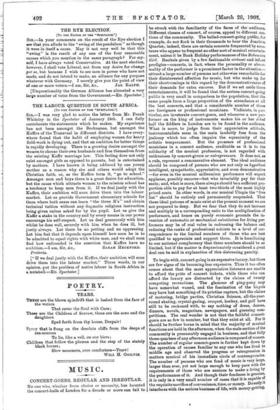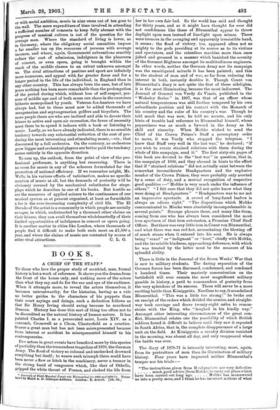MUSIC.
CONCERT-GOERS, REGULAR AND IRREGULAR. No one who, whether from choice or necessity, has haunted the concert-halls of London for a decade or more can fail. to
be struck with the familiarity of the faces of the audience. Different classes of concert, of course, appeal to different sec- tions of the community. The ballad-concert-going public, for example, do not flock in their thousands to hear' the Joachim Quartet ; indeed, there are certain concerts frequented by ama. teura who appear to frequent no other sort of musical entertain. ment, unless it be Bank Holiday performances of the Bohemian Girl. Recitals given by a few fashionable virtuosi and infant prodigies—concerts, in fact, where the personality or abnor. mality of the performer is a prominent factor in the situation— attract a large number of persons not otherwise remarkable for their disinterested affection for music, but who make up for their shortcomings in this regard by the demonstrativeness of their demands for extra encores. But if we set aside these entertainments, it will he found that the serious concert-going public is very small in comparison to the population, that the same people form a large proportion of the attendance at all the best concerts, and that a considerable number of these are foreigners or professional musicians. Violinists, in par. ticular, are inveterate concert-goers, and whenever a new per. former on the king of instruments makes his or her debut half the fiddlers in London are to be found in the audience. What is more, to judge from their appreciative attitude, instrumentalists seem in the main laudably free from the jealousy which too often impairs the equanimity of the artistic temperament. But the presence of professional musicians in a concert audience, creditable as it is to the solidarity of the musical profession, is not regarded with enthusiasm by concert-givers or entrepreneurs. It does not, as a rule, represent a remunerative element. The ideal audience should be composed of persons who are not only ex hypothesi intelligent, sympathetic, appreciative, and even demonstrative —for even in the musical millennium performers will expect applause, possibly encores—but who invariably pay for their seats; and, what is more, there always should be a sufficient pro- portion able to pay for at least two-thirds of the most highly priced seats. In other words, in our musical Utopia the "free list" should be entirely and permanently suspended. That these ideal patrons of music exist at the present moment we are not prepared to deny. But we fear that they do not increase and multiply in a corresponding ratio to the multiplication of performers, and hence on purely economic grounds the in- vention of automatic or mechanical substitutes for living per- formers may be of real value in redressing the balance and reducing the ranks of professional soloists to a level of cor- respondence to the limited numbers of those who are hest qualified to appreciate and support them. It ie humiliating to our national complacency that these numbers should be so limited, but if the matter is dispassionately considered a great deal can be said in explanation of this distressing paucity.
To begin with, concert-going is an expensive luxury, but there are few signs of its becoming less expensive. Thus it too often comes about that the most appreciative listeners are unable to afford the pride of concert tickets, while those who can afford the luxury are distracted by the claims of twenty competing recreations. The glamour of ping-pong may have somewhat waned, and the fascination of the bicycle may have lost something of its pristine rapture, but the claims of motoring, bridge parties, Christian Science, all-the-year- round skating, crystal-gazing, croquet, hockey, and golf have still to be reckoned with, to say nothing of dress, dances, dinners, novels, magazines, newspapers, and guessing com- petitions. The real wonder is not that the faithful concert- goers are so few in number, but that they exist at all. For it should be further borne in mind that the majority of musical functions are held in the afternoon, when the male section of the community is presumably engaged in business, and that fully three-quarters of any afternoon audience is composed of women. The number of regular concert-goers is further kept down by the operation of causes familiar to any one who has lived to middle age and observed the progress or retrogression in matters musical of his immediate circle of contemporaries. The number of persons who are fond of music is very large, larger than ever, yet not large enough to keep pace with the requirements of those who are anxious to make a living by the performance of it. And though their fondness is genuine, it is only in a very small number of cases that it is capable of the requisite sacrifice of convenience, time, or money. Direetly it interferes with the serious business of life, with money-getting, or with social ambition, music in nine cases out of ten goes to the wall. The mere expenditure of time involved in attending a sufficient number of concerts to keep 'fully abreast with the progress of musical culture is Out of the question for the average man. Where the standard of living is lower, as in Germany, where the obligatory social amenities impose a far smaller tax on the. resources of persons with average incomes, and where, again; Government subventions sensibly reanCe the' cost or admission, indulgence in the 'pleasures of concert, or even opera, going is brought within the reach of the middle classes to an extent unknown amongst as. The rival attractions of pastime and sport are infinitely more numerous, and appeal with far greater force and for a longer period in the life of the individual, in England than in any other country. This has always been the case, but of late years nothing has been more remarkable than the prolongation of the period during which, without loss of self-respect, per- sons of middle age and of both sexes can share in the exercises hitherto monopolised by youth. Veteran fox-hunters we have always had, but to these must now be added thousands of sexagenarian and septuagenarian golfers and bicyclists. The more people there are who are inclined and able to devote their leisure to active and open-air recreation, the fewer of necessity mast there be to spend it indoors with a book or listening to music. Lastly, as we have already indicated, there is no sensible tendency towards any substantial reduction of the cost of pro- ducing the most interesting and stimulating music,—viz., that discoursed by a full orchestra. On the contrary, as orchestras grow bigger and-orchestral players are better paid the tendency seems entirely in the opposite direction.
To sum. up, the outlook, from the point of view of the pro- fessional performer, is anything but reassuring. There is no room for music in any of the schemes formulated for the promotion of national efficiency. " If we remember aright, Mr. Wells, in his various efforts of vatieination, makes no specific mention of music at all, but the demands of posterity will be obviously covered by the mechanical substitutes for stage- plays which he describes in one of his books. But hostile as are the resources of applied science to the continuance of our musical system as at present organised, at least as formidable a foe is the ever-increasing complexity of civil life. The El Dorado of the artist is a community in which people are socially savages, in which, undistraeted by a thousand other claims on their leisure, they can avail themselves wholeheartedly of their limited opportunities of indulgence in concert or opera going. It is another matter in cities like London, where thousands of people find it difficult to make both ends meet on 21,500 a year, and where the claims of music are contested by scores of











































 Previous page
Previous page